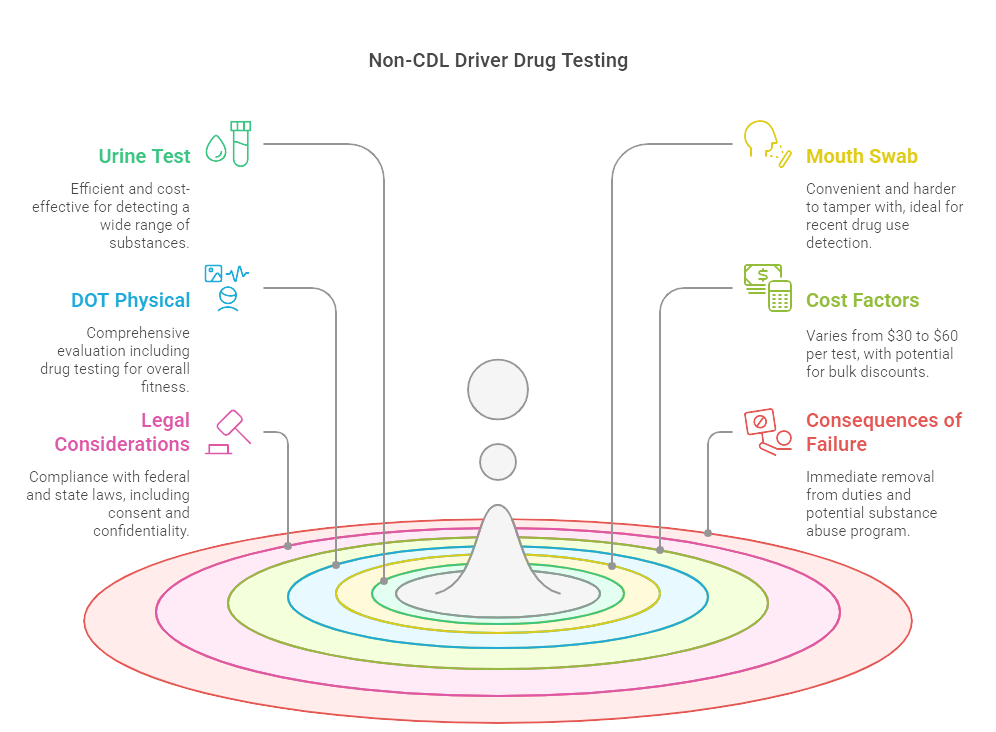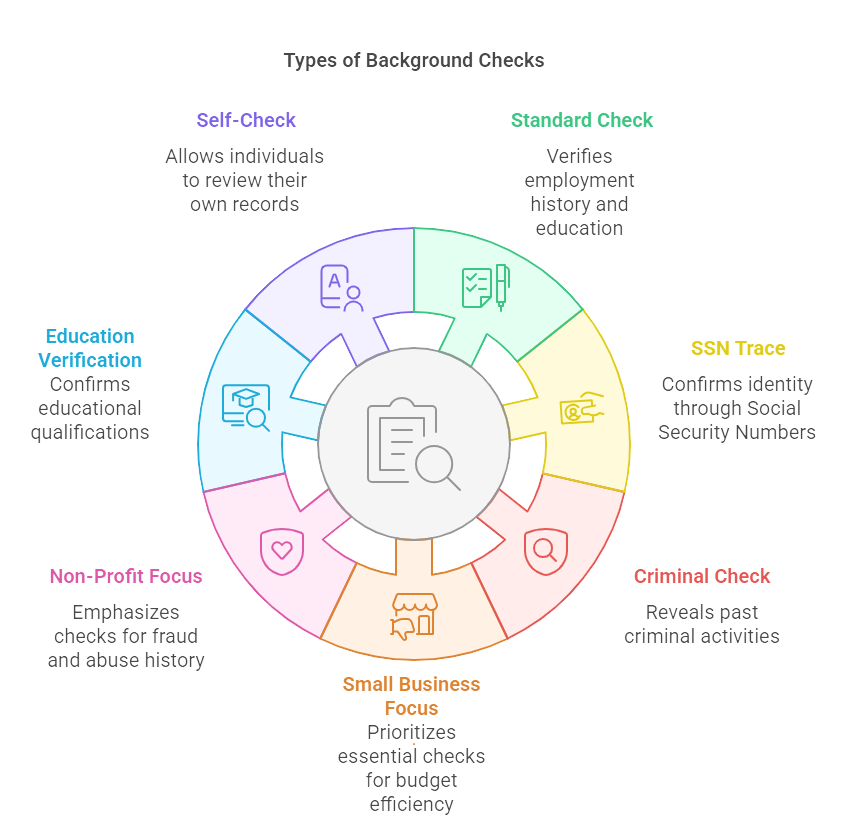Keeping your organization compliant and safe is crucial, especially when hiring non-CDL drivers. Whether you're a business owner, HR professional, recruiter, or job seeker across various industries, understanding these non-CDL driver requirements is vital.
Key Takeaways
- Ensuring compliance with drug testing and background checks for non-CDL drivers is crucial for operational safety.
- Non-CDL drivers, while not needing a commercial driver's license, must still meet DOT and FMCSA regulations.
- Different drug tests like urine, mouth swabs, and DOT physical tests are essential to maintain a drug-free workplace.
- Comprehensive background checks, including criminal history and SSN trace, are vital for verifying the suitability of non-CDL driver requirements of candidates.
- Both employers and job seekers benefit from adhering to clear, legal procedures and being transparent about past issues to ensure a trustworthy hiring process.
Introduction
Keeping your organization compliant and safe is crucial, especially when hiring non-CDL drivers. Even though a Commercial Driver's License isn't mandatory, ensuring that your drivers meet specific requirements is vital for operational integrity. In this article, we’ll dive into two essential aspects: drug tests and background checks for non-CDL drivers. Whether you're a business owner, HR professional, or job seeker, you'll find key information to navigate these requirements efficiently. Proper vetting helps avoid risks, ensuring safety and reliability for everyone on the road.

Understanding Non-CDL Driver Requirements
Definition
So, what's a non-CDL driver? Simply put, these are drivers who operate vehicles that don't require a Commercial Driver's License (CDL). We're talking about roles such as delivery drivers, shuttle bus operators for businesses, or even those running small company vans. They’re essential cogs in the machinery of many industries, making sure that goods and people get where they need to be without carrying the hefty responsibilities that come with a CDL.
Regulatory Overview
Even though these drivers don’t need a CDL, they're not free from regulation. While it might seem less stringent, the Department of Transportation (DOT) and the Federal Motor Carrier Safety Administration (FMCSA) still have a say. These bodies ensure that non-CDL drivers meet certain standards that keep the roads safe for all of us. We’re talking about mandates like proper vehicle maintenance checks, and yes, drug testing and background checks, which we’ll dive into in the next sections. Ignoring these protocols isn’t just risky—it’s against the law.
EXPERT INSIGHT: In HR, behind every requirement to be compliant is a human story—a person's safety, someone's livelihood. In hiring non-CDL drivers, the real question isn't just "are we compliant?" The real question is "are we protecting livelihoods and lives with intention?" I've witnessed what's happened when corners were cut—trust disappears in an instant and takes far longer to rebuild than doing it right to begin with. Compliance to me is just bare bones; real leadership is infusing every hiring decision with compassion and accountability. Because when all is said and done, it's about who's operating your vehicles and it's about who's operating your culture. - Charm Paz, CHRP
Drug Testing for Non-CDL Drivers
Ensuring that your non-CDL drivers are free from substance abuse is non-negotiable for safety and compliance. Although they might not require a commercial driver's license, these drivers still play a pivotal role in your operations. Here's what you need to know about drug testing as part of non-CDL driver requirements.
Types of Drug Tests
Urine Drug Test
The urine drug test is the go-to choice for many employers. It's efficient, cost-effective, and covers a wide range of substances—everything from marijuana to opioids. Typically, the process involves the employee providing a urine sample, which is then analyzed in a lab to identify any traces of illegal or prohibited substances.
Drug Mouth Swab
A less invasive alternative is the drug mouth swab (oral fluid test). This method is appreciated for its convenience and ability to detect recent drug usage. Candidates simply swab the inside of their mouth, and the sample is tested for substances. While less comprehensive than urine tests, it offers a quicker turnaround and is harder to tamper with.
Non-CDL DOT Physical Drug Test
Even though a DOT physical isn't a must for non-CDL drivers, some companies opt for a similar standard. This includes a drug test as part of a more holistic physical evaluation. It checks for substances and assesses whether a driver is physically and medically fit to perform their duties.
Cost Factors
Urine Drug Test Cost
Costs for urine drug tests can vary widely but typically range from $30 to $60 per test. Bulk testing or partnerships with testing providers can help reduce these costs. Employers should account for this expense as part of their regular compliance budget.
Legal Considerations
Compliance Requirements
Employers must navigate a maze of regulations when implementing drug testing. While the DOT and FMCSA primarily regulate CDL drivers, non-CDL drivers are still subject to federal and state laws. Compliance can include providing notice of testing policies, obtaining written consent, and ensuring confidentiality. Refer to the FTC and EEOC guidelines to stay updated.
What Happens if You Fail a Drug Test?
Failing a drug test isn't something anyone wants to deal with, but it's crucial to know the protocols. Typically, a failed result means immediate removal from duties and possibly mandatory participation in a substance abuse program. The specific consequences can vary based on company policies and state laws. Employers should have clear procedures and support systems in place.
By implementing thorough and compliant drug testing procedures, businesses can safeguard both their operations and the public, ensuring that their workforce is dependable and safe.

Health Screening for Non-CDL Drivers
What is a Health Screening for a Job?
A health screening for a job is a routine check-up to ensure that an employee is physically and mentally fit to perform their duties safely and efficiently. These screenings often include basic medical exams such as measuring blood pressure, checking vision and hearing, and conducting a general physical assessment. They may also involve specific tests relevant to the job requirements.
For non-CDL drivers, health screenings can be particularly important. Although these drivers are not operating commercial vehicles that require a commercial driver’s license, they still perform tasks that demand alertness and physical fitness. The screenings help identify any underlying health issues that could compromise safety, such as chronic illnesses, mobility issues, or substance use disorders.
Role-Specific Health Checks for Non-CDL Drivers
Non-CDL driver positions can be diverse, ranging from delivery drivers to shuttle bus operators. Because of this, role-specific health checks may also be necessary. For example:
- Vision Tests: Ensuring that a driver has adequate vision is fundamental. This includes tests for acuity, depth perception, and peripheral vision.
- Hearing Tests: Good hearing is essential for noticing potential hazards such as sirens or alarms.
- Physical Fitness Tests: Some non-CDL driving jobs might require lifting heavy packages or being on one’s feet for extended periods. Physical fitness tests can evaluate strength, endurance, and flexibility.
These health screenings are not just about meeting regulatory requirements. They are about ensuring the well-being of employees and the safety of everyone on the road. By integrating comprehensive health screenings into your hiring process, you minimize risks and promote a healthier, more efficient workforce.
Background Checks for Non-CDL Drivers
Background checks are a critical component in the hiring process, ensuring that potential employees have trustworthy and clean records. Whether you're a small business owner or part of a larger corporate team, understanding the different types of background checks and their importance can save you from potential headaches down the line.
Types of Background Checks
- Standard Background Check: This is the most common type, covering employment history, education verification, and professional references. It's a broad sweep that gives a comprehensive view of a candidate's background.
- SSN Trace Background Check: This type helps verify a candidate's identity by tracking Social Security Numbers across various databases. It's useful to ensure that the applicant is who they claim to be.
- Criminal Background Check: This is arguably the most crucial, as it checks for any past criminal activity. Whether it's a misdemeanor or a felony, knowing the criminal history of your potential hire is vital for maintaining workplace safety and security.
Special Considerations for Different Sectors
- Background Checks for Small Businesses: Small businesses often operate with tighter budgets and fewer resources. However, this doesn't mean you can skip thorough checks. Focus on core essentials like criminal checks and SSN traces to get the most bang for your buck without compromising on safety.
- Non-Profit Background Checks: The non-profit sector often deals with vulnerable populations, making background checks even more critical. Ensure you include checks for any history of fraud or abuse to protect those you serve.
Questions and Clarifications
- Does a Background Check Show if You Graduated?: Yes, an education verification check can confirm if a candidate has the degrees they claim to have obtained. This helps in verifying their qualifications for the job.
- Background Check for Self: Individuals can also run background checks on themselves to see what potential employers might find. This can be particularly useful for identifying and addressing any discrepancies or issues before they become a barrier to employment.
By conducting thorough and appropriate background checks, employers can make informed hiring decisions, thereby creating a safer and more reliable workplace environment. It's not just about regulatory compliance; it's about ensuring you have the right people driving your business forward.

Preparing for Background Checks and Drug Tests
For Employers
Best Practices
Hiring non-CDL drivers requires a diligent approach to stay compliant and fair. Start by ensuring all your practices align with legal standards. Develop clear policies outlining your background check and drug test processes. Your guidelines should be transparent and consistently applied to every candidate to avoid any legal issues.
Documentation
Proper documentation is crucial. Secure written consent from candidates before conducting background checks or drug tests. This paperwork not only protects your organization legally but also builds trust with potential hires. Be thorough in collecting all essential details to avoid unnecessary delays.
Internal Policies
Establish internal policies that detail every step from screening to results management. Communicate these policies clearly within your hiring team. Regular training on compliance requirements and best practices will ensure everyone on your team is on the same page, minimizing errors and improving efficiency.
For Job Seekers
Preparation Tips
Prepare yourself thoroughly before undergoing a background check or drug test. Gather all necessary documents and ensure there are no discrepancies in your records. Knowing what to expect can alleviate anxiety and help you present yourself in the best possible light.
Addressing Past Issues
If you have any past drug test failures or criminal records, be proactive in addressing these issues. Transparency can go a long way. Discussing your history openly and showcasing steps you've taken to improve can positively influence an employer's perception. Rehabilitation proof or character references can also bolster your case.
By adhering to these preparation strategies, both employers and job seekers can approach the background check and drug testing process with confidence and clarity.
Frequently Asked Questions (FAQ)
What happens if I fail a drug test as a non-CDL driver?
Failing a drug test can have serious consequences, including the immediate termination of a job offer or employment. Employers typically have strict policies in place and may offer resources like substance abuse programs for current employees. It's crucial to know your company's policies beforehand.
Do non-CDL drivers need health screenings?
Yes, as part of non-CDL driver requirements, health screenings are often required to ensure that drivers are fit for duty. These can range from basic physical exams to more specific tests based on the job's demands. While not as rigorous as CDL driver requirements, they are vital for maintaining safety standards.
What types of background checks are required for non-CDL drivers?
The common types include standard background checks, SSN trace background checks, and criminal background checks. These checks help verify identity, ensure a clean criminal record, and maintain workplace safety.
How much does a drug test typically cost?
Costs can vary, but a standard urine drug test generally ranges from $30 to $60. Factors like the type of test and the lab's location can influence the price.
Can my employer see my educational qualifications on a background check?
Yes, employers can verify your educational history, including graduation status, during a background check. This helps to ensure that all the qualifications listed on your resume are accurate.
Conclusion
In summary, ensuring proper drug tests and background checks for non-CDL drivers is essential for maintaining a safe and compliant workforce. By paying close attention to non-CDL driver requirements, you're not only adhering to legal requirements but also prioritizing the reliability and safety of your operations.
Hiring non-CDL drivers involves more than just assessing their driving skills. Drug tests such as urine and mouth swabs, paired with thorough background checks that include criminal and SSN trace verifications, provide a comprehensive view of a candidate’s suitability. These measures help to identify potential risks and uphold a standard of excellence within your organization.
To all employers and HR professionals, taking a proactive approach to implement or refine your drug testing and background screening procedures can significantly enhance your hiring process. Clear internal policies, combined with thorough and fair execution, will help in building trust and credibility.
For job seekers, being prepared and transparent about past issues can make a positive difference. Equip yourself with the knowledge of what to expect, and take steps to address any previous setbacks you’ve faced.
In the end, maintaining rigorous standards in drug testing and background checks isn't merely about compliance—it's about building a trustworthy and dependable team. So, take the necessary actions today, and set your organization on the path to sustained success.

